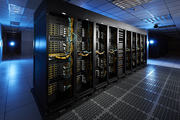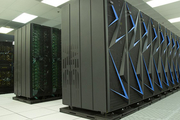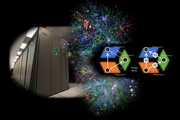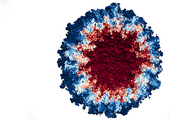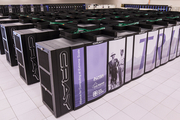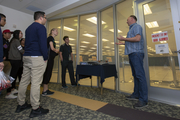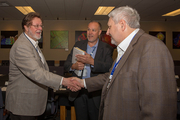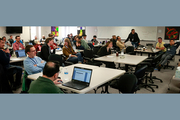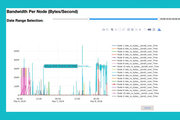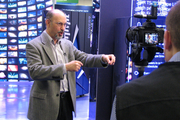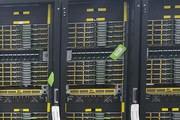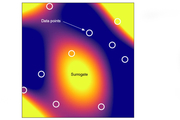Did you know we have a monthly newsletter? View past volumes and subscribe.
Lockdown doesn’t hinder annual Data Science Challenge
June 26, 2020 -
Due to the COVID-19 pandemic and shelter-in-place restrictions, this year’s Data Science Challenge with the University of California, Merced was an all-virtual offering. The two-week challenge involved 21 UC Merced students who worked from their homes through video conferencing and chat programs to develop machine learning models capable of differentiating potentially explosive materials from...
DL-based surrogate models outperform simulators and could hasten scientific discoveries
June 17, 2020 -
Surrogate models supported by neural networks can perform as well, and in some ways better, than computationally expensive simulators and could lead to new insights in complicated physics problems such as inertial confinement fusion (ICF), LLNL scientists reported. Read more at LLNL News.
UC Merced students receive NSF research fellowships
June 3, 2020 -
Maia Powell, a PhD student in Applied Mathematics at UC Merced, has been awarded a National Science Foundation Graduate Research Fellowship. Powell participated in the DSI's Data Science Challenge this summer, serving as a team lead for other students. Read more at UC Merced.
AI hardware for future HPC systems (VIDEO)
May 20, 2020 -
This interview with Brian Spears, who leads cognitive simulations at LLNL, covers the current state of evaluation of AI chips and how those will mesh with existing and future HPC systems. Watch on YouTube.
The incorporation of machine learning into scientific simulations at LLNL (VIDEO)
May 5, 2020 -
In this video from the Stanford HPC Conference, Katie Lewis presents "The Incorporation of Machine Learning into Scientific Simulations at Lawrence Livermore National Laboratory." Read more and watch the video at insideHPC.
Upgrades for LLNL supercomputer from AMD, Penguin Computing aid COVID-19 research
April 21, 2020 -
Under a new agreement, AMD will supply upgraded graphics accelerators for LLNL’s Corona supercomputing cluster, expected to nearly double the system’s peak compute power. The system will be used by scientists through the public/private COVID-19 HPC Consortium, and by LLNL researchers, who are working on discovering potential antibodies and anti-viral compounds for SARS-CoV-2, the virus that...
New partnership to unleash U.S. supercomputing resources in the fight against COVID-19
March 26, 2020 -
The White House announced the launch of the COVID-19 High Performance Computing Consortium to provide COVID-19 researchers worldwide with access to the world’s most powerful high performance computing resources that can significantly advance the pace of scientific discovery in the fight to stop the virus. Read more at LLNL News.
Deep learning may provide solution for efficient charging, driving of autonomous electric vehicles
Feb. 4, 2020 -
LLNL computer scientists and software engineers have developed a deep learning-based strategy to maximize electric vehicle (EV) ride-sharing services while reducing carbon emissions and the impact to the electrical grid, emphasizing autonomous EVs capable of offering 24-hour service. Read more at LLNL News.
Department of Energy researchers share data management strategies at first-ever “Data Day”
Nov. 11, 2019 -
It’s become something of a mantra of the digital age: Data is the new currency. Especially in science, where it’s hard to find a single project that doesn’t involve generating or consuming massive amounts of data.
In light of the growing awareness of the critical importance of data management across the Department of Energy complex, more than 100 researchers from DOE national laboratories...
LLNL team achieves largest graph analytics to date
Oct. 28, 2019 -
Besides broad usage in the tech industry, graph analytics also have national security applications, where algorithms dig through massive datasets to find anomalies or patterns of nefarious activity. It’s in that vein that an LLNL team of computer scientists and applied mathematicians, including Roger Pearce, Geoffrey Sanders, postdoc Benjamin Priest and visiting scholar Trevor Steil, searched...
Successful simulation and visualization coupling proves the power of Sierra
Oct. 22, 2019 -
As the first National Nuclear Security Administration (NNSA) production supercomputer backed by GPU- (graphics processing unit) accelerated architecture, Sierra’s acquisition required a fundamental shift in how scientists at Lawrence Livermore National Laboratory (LLNL) program their codes to take advantage of the GPUs.
The majority of Sierra’s computational power—95 percent of its 125...
Hyperion Research announces new winners of HPC Innovation Excellence Awards
June 18, 2019 -
Hyperion Research announced the 14th round of recipients of the HPC Innovation Excellence Award at the ISC19 supercomputer industry conference in Frankfurt, Germany. Led by Brian Spears, an LLNL team used the Trinity supercomputer to seek out successful modes of laser-driven fusion implosions by building an enormous database for supervised training of a machine learned surrogate...
Two-week workshop lets UC Merced students step into shoes of Lab computer scientists
June 12, 2019 -
From May 20-31, 21 undergraduate and graduate students, many of them first-generation college students, interned at the Lab. While they were on site, the students, along with their Lab mentors, were tasked with using machine learning and other computational methods to tackle real-world problems in computational immunology. Read more at LLNL News.
NFL comes to Lab to hear latest on TBI research
June 5, 2019 -
Officials from the National Football League visited LLNL to hear how the Department of Energy’s national laboratories are using high-performance computing and artificial intelligence to advance scientific understanding of traumatic brain injury (TBI). Read more at LLNL News.
ESGF conference caps a productive year
Feb. 12, 2019 -
Members of the Earth System Grid Federation (ESGF) gathered in Washington, DC, on December 3–7 for the 8th annual conference. The event packed 40 presentations, several plenary sessions, a poster session, guest speakers, an awards ceremony, and an executive committee meeting into the week. The Lawrence Livermore National Laboratory (LLNL) delegation comprised 19 staff from the Computation and...
Dispatches from the fall hackathon
Dec. 18, 2018 -
This recap of LLNL's seasonal hackathon was provided by the web team that manages several LLNL websites. Mike Goldman, director of the Data Science Institute (DSI), stopped by the team's table during the hackathon to discuss the Open Data Initiative. Read more at LLNL Computing.
A bird's-eye view of computing performance
Dec. 7, 2018 -
LLNL’s HPC center runs 24 hours a day, 7 days a week. HPC performance data is collected from many different sources within the facility and includes metrics on network utilization, rack temperature and humidity, power consumption, application runtimes, and message routing. Such information is essential for understanding how efficiently the facility operates. The analysis tool ScrubJay—named...
DOE machines dominate record-breaking SC18
Nov. 20, 2018 -
They say everything’s bigger in Texas, and the 30th anniversary of the annual International Conference of High Performance Computing, Networking, Storage and Analysis (SC18), held Nov. 11-16 in Dallas, did not disappoint. The conference, which broke records for attendees and exhibitors, saw LLNL once again make its presence felt on the world’s biggest HPC stage. For the first time in five...
New computing cluster coming to Livermore
Nov. 8, 2018 -
LLNL, in partnership with Penguin Computing, AMD and Mellanox Technologies, will accept delivery of Corona, a new unclassified high-performance computing (HPC) cluster that will provide unique capabilities for Lab researchers and industry partners to explore data science, machine learning and big data analytics. Read more at LLNL News.
Machine learning points toward new laser target designs
Oct. 8, 2018 -
When the Trinity supercomputer at Los Alamos National Laboratory was first coming online, calls went out for research projects that would test—and potentially break—the new system. LLNL researchers answered the call, and their work with Trinity and machine learning could disrupt 40 years of assumptions about inertial confinement fusion (ICF). The project essentially turned Trinity—then a 8.1...






